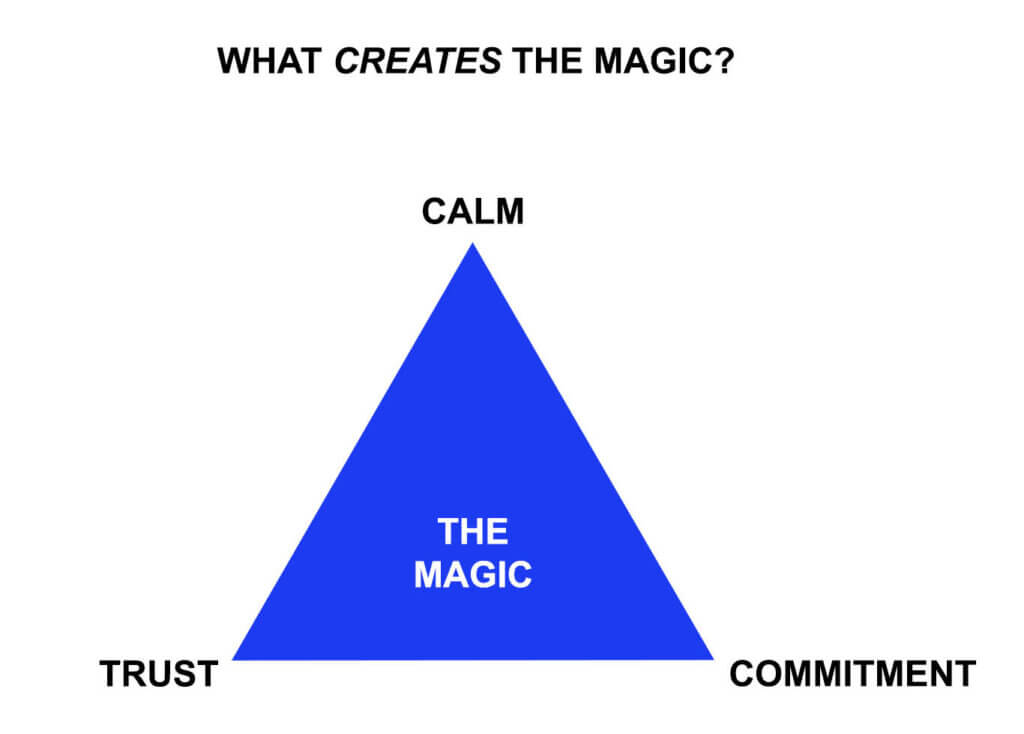According to relationship researchers John and Julie Gottman, a whopping 83% of heterosexual couples have problems with romance and passion in America. Yep, pretty obvious, I see these couples every day at Doxa, but how do the Gottmans measure the state of happiness?
Straight out of the gate, questions started to appear in my head about optimizing treatment for my couples. Where is the tipping point between happy couples and their not so happy counterparts who will break up at the end? Is there a magic ratio of negativity and positivity that we should shoot for in therapy, in order to maximize a couple’s chances for happiness? There sure is, John Gottman has said. His research team found the magic ratio, believe it or not, not in the number of vacations or happy meals a couple enjoyed together, but in their arguments!
Balancing the Ratio of Positive and Negative Emotions in Relationships
The balance of positive and negative emotions indexes the magic in long-term couple’s relationships. Happy couples have a 5 to 1 positive to negative ratio during their conflicts as opposed to a 0.8 to 1 positive to negative ratio in unhappy couples.
The Relationship Roach Motel
Have you ever opened the door to a motel room just to catch a glimpse of a roach scurrying across the room aiming for the shelter of some dusty furniture? You probably knew that “where there’s a roach, there’s more.” This is true for negativity in coupled relationships too.
How Negativity Multiplies
Neutral or positive affect enters a relationship easily. We love to have what makes us feel good, but it also leaves easily. On the contrary, negative affect, just like roaches in a shady motel, abounds easily, due to easy return. Once it enters, it will re-enter more easily. Easy return of negative affect, coupled with escalated arguments, leads to an upside-down ratio of positive to negative emotions and an infestation of the relational roach motel. As Gottman explains, negative affect is a more robust predictor of relationship outcome than positive affect.
Keeping the Negativity Out
So, is it possible to keep roaches completely out of your relationship? No, not really. However, it is possible to keep the number of them down and to avoid an infestation that leads to relationship dissolution.
Gottman illustrates the necessary ingredients for roach control (the “magic” of couple’s happiness) using a equilateral triangle with Calmness, Trust and Commitment at each corner of the triangle.

Ingredients for the Magic of Couple’s Happiness
Calm Physiology
Couples need to learn how to calm themselves down and thus increase vagal tone (the ability to self-soothe, which is not genetically inherited, it is modifiable). When you are in an argument, you:
- Are physiologically aroused
- Cannot listen very well
- Get tunnel vision
- Cannot problem solve positively
- Cannot empathize with your partner
In fact, neither of you can empathize with one another, even if you are not narcissistic but an otherwise pretty nice person. Learning to recognize when you are flooded (overwhelmed with emotions and physiologically aroused), is a crucial first step in mastering calming down. If you don’t know how to do this, just reach out to us, and we will teach you!
Mutual Trust
Trust leads to intimacy, and distrust turns off intimacy.
In order to research trust exchanges in coupled relationships, the Gottmans turned to game theory. According to game theory, we exchange carefully selected strategies to maximize our benefit metric. Applied to relationships, each partner wants what is pleasure giving, not only for themselves, but also for their partner. To illustrate this, think about the last time you wanted to spend some romantic time with your partner. What strategies did you choose to get your partner’s attention and maximize relational benefits? How did you put your best foot forward in order to impress your partner? Did you perhaps pick up the house or put the kids to bed early so the two of you can enjoy some time together? Whatever it was, you carefully selected the strategy and played your best game based on your knowledge of your partner, in order to maximize your chances for a great game night. We do this, not only to benefit ourselves, but also our partner.
Commitment to the Relationship
Commitment leads to loyalty, and betrayal leads to disillusionment.
Let’s make it clear: betrayal does not equal distrust. Betrayal is essentially a zero sum game. There is a winner and a loser. If you add those up, you end up with a zero sum game. It’s great to declare a winner at the end of a basketball game, but not so great in a marriage. Control and power struggles are detrimental to human relationships. When things are going badly in a relationship, and major decisions have to be made, people either choose the betrayal pathway (i.e. secrecy, comparison of partner to someone else, trashing partner) or they choose the commitment pathway (voicing complaints constructively, working it out, and cherishing their partner).
The goal? A win-win game!
Marti Witherow has close to 20 years of experience working with couples, families and individuals. Marti is an AAMFT Clinical Fellow and has extensive training in several areas of counseling, including Internal Family Systems Therapy and Sex Therapy. She is a Licensed Marriage and Family Therapist, Licensed Professional Counselor, a Certified Sex Therapist (by the American Board of Christian Sex Therapists) and board-eligible to become an LPC Supervisor.
